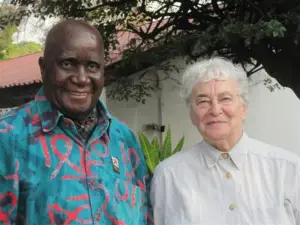
“Tiende pamodzi ndim’tima umodzi. Stand and sing of Zambia proud and free! ”
Almost 50 years ago these words were not spoken but sung! by Zambia’s President Kenneth Kaunda at the end of the first lunch of his state visit to Bonn.
As always, he started with his favourite song, accompanied by all the Zambians. Was that a surprise for Federal President Walter Scheel back in the 1970s? In any case, it came as a surprise to me that KK, as he was affectionately known, had called his delegation to the main table and I was now alone at the Zambian press table. I could have sung along, but I didn’t want to cause a stir and I would certainly not have sounded as good as the Zambians I was sitting among. And besides, I was employed by Deutsche Welle at the time.
Now the first president of Zambia, formerly Northern Rhodesia, which has been independent since 1964, died in June 2021 at the age of 97 after a short illness – KK, the last of the first generation of those young African leaders who, after the end of the Second World War, stood and fought for liberation from the colonial rulers.
Africa has lost one of its heroes, his family lost its leading figure, many a friend, including myself.
Northern and Southern Rhodesia and Nyassaland, today’s Malawi, had been united in the Central African Federation since 1952, but the entire African population of the region rejected this union. After negotiations with the British colonial power, Northern Rhodesia and Nyassaland became independent in 1964, while Southern Rhodesia had to fight until 1980 when it finally became Zimbabwe.
One year after Zambia’s independence, the white minority government of the neighbouring country of Southern Rhodesia unilaterally declared its illegal independence, Kaunda’s path had become very difficult.
The president had taken over a prosperous economy with optimism. Due to the closing of the borders with the white neighbours, this was now cut off from access to important ports, which meant major problems for copper exports and a shortage of consumer goods. Nonetheless, he refused to compromise and remained an open opponent of apartheid throughout the 27 years of his presidency. When he resigned in 1991 after losing the election, South Africa had finally given up its racist policy the year before.
Kaunda’s electoral defeat, however, was largely due to the fact that his anti-apartheid policy, coupled with economic errors and increasingly autocratic behaviour, had made him an enemy.
After his resignation, Kaunda started a new fight – against HIV, after openly declaring that he had lost a son to AIDS.
Who was KK? In any case, a deeply religious man to whom family, wife and nine children were important and who always showed ties to the people.
He accompanied his first campaigns with the guitar and made music with the great singer Miriam Makeba. His charm belonged to him like the white handkerchief with which he always showed himself in public – to wave, also to dry eyes.
Like so many leaders, he was convinced of his task, but he had recently proven that he was not obsessed with power like many others. His fellow citizens thanked him for this so that in retirement he was the first citizen to enjoy great popularity again.
The time of rebellion has faded in the minds of today’s generation of young Africans. When Kaunda started singing ‘Tienda pamodzi’ at a meeting with young people a few years ago, the audience did not join in, as he was used to.
“Oh,” he said, “you forgot.”
Much may have been forgotten. But the smiling, friendly First President of independent Zambia will not forget the history of his country.
Note: You can also find insights and retrospectives on the Kenneth Kaunda in many journalistic articles by Ruth Weiss from those years that you can read or listen to in the archive of the Basler Afrika Bibliographien. Her autobiography ‘Paths in the Hard Grass’ also reveals the time of the decolonization of Southern Africa through her personal experience reports with leading African politicians.
